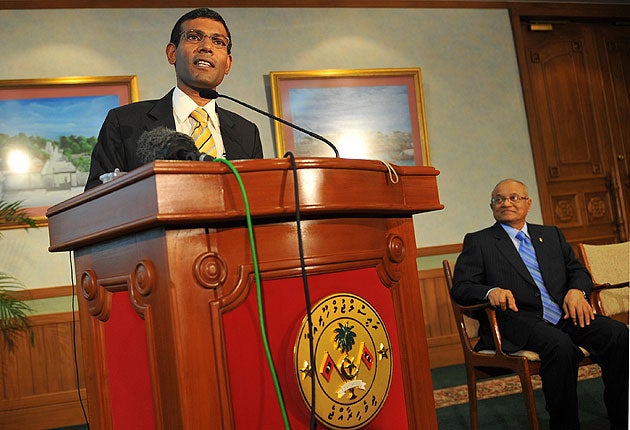Asia's longest-serving ruler ousted in Maldives

The man who was the effective dictator of the Maldives for 30 years has been forced to concede defeat to a man he jailed more than half-a-dozen times following the island nation's first presidential election.
Former political prisoner Mohamed Nasheed secured 54 per cent of the vote to defeat Asia's longest-serving ruler, Maumoon Abdul Gayoom, in a run-off between the two bitter rivals. As people in the island nation woke up to the news this morning, Mr Nasheed's supporters poured onto the streets in joyous celebrations.
Later, in a live address, the man dubbed by his party the "Mandela of the Maldives", said: "I wish to assure the public and the international community that the transition to democracy in the Maldives will be smooth and uninterrupted in governance. We would want to introduce greater democracy. More freedoms. Freedom of expression."
In turn, Mr Gayoom, 71, who has ruled the predominantly Muslim nation with an authoritarian grip since 1978 and who violently crushed all opposition, was forced to admit defeat. While he had claimed victory in six previous elections, this was the time he faced an opponent. "I accept the results of the run-off election and I respectfully congratulate Mr Mohamed Nasheed and his party," he said. "I am declaring my full support to him."
Mr Gayoom never wanted to hold the election. He did so under mounting domestic and international pressure that forced him to begin in 2004 a series of reforms that lifted a ban on opposition parties, supported a new constitution and agreed to the first multi-party presidential election.
Having dominated the nation of just 370,000 people, the election was seen a referendum on his rule and a remarkable 87 per cent of the population turned out to vote. Mr Gayoom's supporters argued he had boosted tourism and brought development to the country but in the end more peo
ple found his opponent's message of democratic reform more compelling.
"We want a change. It makes a big difference to be able to choose and decide," Ibrahim Shameem, a 47-year-old civil servant told the Associated Press, as he voted in yesterday's run-off ballot. "Before, even though we voted, we didn't know if our vote was counted."
Mr Nasheed, a former journalist and head of the Maldivian Democratic Party (MDP), was just 11 when Mr Gayoom first won power. After the first round of the election, held earlier this month, the democracy activist was left trailing the incumbent by more than 15 points. However, he quickly he won the support of the three other opposition candidates knocked out of the race who rallied to his demand for change.
The contest between the two men was often ugly, with character attacks being played out in the media. However, Mr Nasheed, who was forced into exile in both Britain and Sri Lanka, has ruled out pursuing criminal charges against his rival and said he will instead organise a pension and adequate security for him
"A test of our democracy will be how we treat Maumoon. I don't think we should be going for a witch-hunt and digging up the past," he said. "This is a happier day than ever in the history of the Maldives. The Maldives will change, it will have a peaceful government."
Under Mr Gayoom's rule the Maldives, made up of more than 1,000 islands, has been transformed from a fishing community to a major international tourism destination. But the nation is facing a number of problems, not least the impact on tourism - which accounts for 28 per cent of GDP and 60 per cent of foreign currency earnings - as a result of the international financial crisis.
The former British colony located off the south-west tip of India, is also confronting the problem of rising sea levels caused by global warming. The capital, Male, is surrounded by a 3m-high wall that cost more than £30m to build and took 14 years to complete. But around 80 per cent of the country's islands are no more than one metre above sea level. After the Asian tsunami up to 40 per cent of the country was left lying under water.
Subscribe to Independent Premium to bookmark this article
Want to bookmark your favourite articles and stories to read or reference later? Start your Independent Premium subscription today.

Join our commenting forum
Join thought-provoking conversations, follow other Independent readers and see their replies